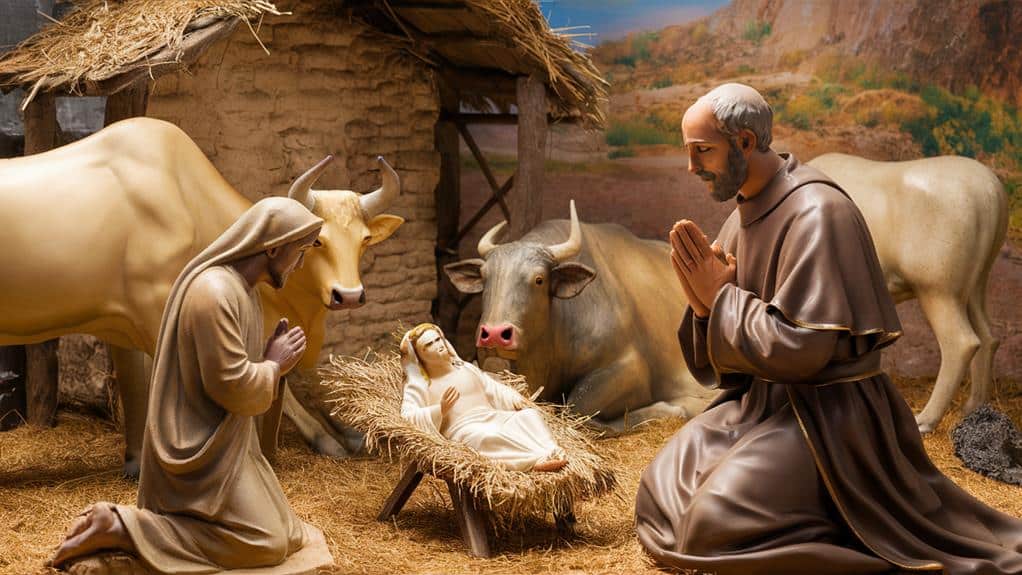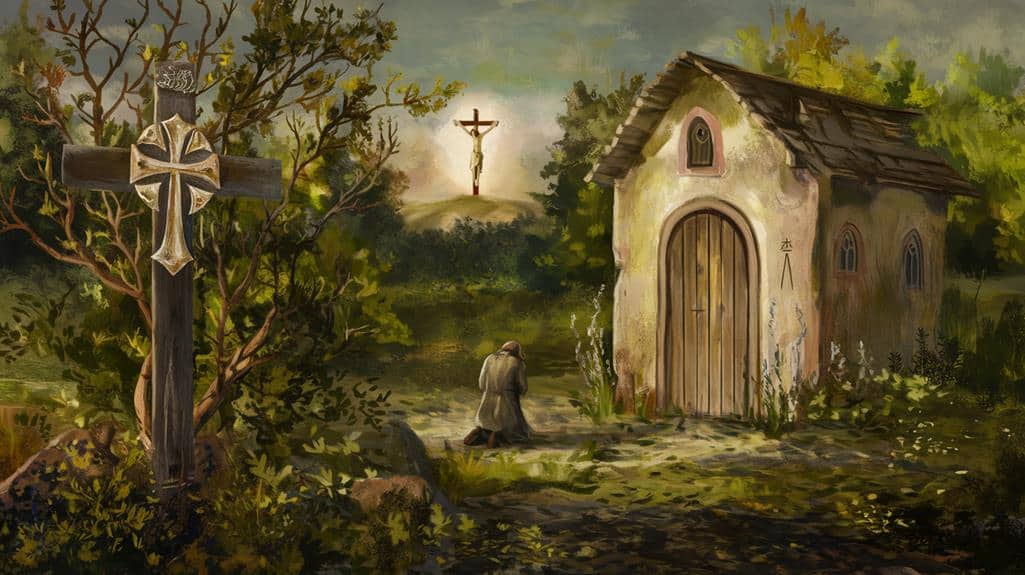Franciscan Mysticism
When you explore Franciscan Mysticism, you’re invited to experience a profound, experiential connection with God that transcends intellectual understanding. This spirituality emphasizes your personal encounters with the divine, encouraging you to see God’s presence in every aspect of creation. By embracing the Incarnation of Jesus, you’re reminded of God’s intimate love for humanity and the interconnectedness of all things. As you commence on this journey, you’ll discover the importance of simple and humble living, solidarity with the poor, and the integration of action with contemplation. How will this transformative approach to faith shape your daily life and interactions with the world around you?
Experiential Spiritual Knowledge

In the heart of Franciscan mysticism lies an experiential spiritual knowledge that eschews doctrinal abstractions and moralism. This approach to spirituality, as exemplified by St. Francis of Assisi, emphasizes a direct, personal experience of God rather than mere intellectual or secondhand knowledge.
When you embrace Franciscan mysticism, you’re invited to trust your inner experiences and the guidance of the Holy Spirit, rather than solely relying on outer authorities like scripture or church hierarchy.
This experiential knowledge is rooted in the practical application of spiritual principles. For St. Francis, this meant living out the Gospel literally, as when he heard the words “Take no gold, or silver, or copper in their belts” and immediately chose a life of poverty and service.
This isn’t about seeking secret knowledge or exclusive spiritual experiences, but about living in harmony with God’s will as revealed through everyday actions and interactions.
In Franciscan mysticism, God’s presence becomes palpable and undeniable, not just a belief system. You come to know God through the beauty of creation, the humility of Jesus, and the love that permeates all existence.
This is a mysticism that encourages you to become what you already are – a reflection of God’s love and goodness – and to live this truth with courage and self-confidence.
Connection With Creation
Embracing the experiential spiritual knowledge of Franciscan mysticism naturally leads you to a profound connection with creation. In this tradition, you’re invited to see the world as an interconnected web of life, where every creature is a brother or sister, reflecting the divine kinship that binds all things together. This holistic view, inspired by St. Francis, fosters a deep sense of responsibility and respect towards the environment and all its inhabitants.
As you explore Franciscan theology, you come to understand creation as God’s footprint, a reflection of His glory and presence. The natural world is seen as the “first book” through which God reveals Himself, inviting you to read and understand divine love in the beauty and complexity of nature.
This connection with creation isn’t just a theoretical concept but a lived experience. It involves recognizing the sacredness of all life and advocating for a compassionate and inclusive approach to living. By seeing God’s life living itself in you and in all things, you’re called to love what God loves, allowing divine love to flow through you and expressing itself in your care for the Earth and its inhabitants.
In this mystical perspective, every action becomes a form of stewardship, and every moment an opportunity to honor the divine presence in all creation. This transformative understanding encourages you to live simply, authentically, and in harmony with the natural world, ensuring that your actions contribute to the well-being of the Earth and all its inhabitants.
Incarnation and Humanity of Jesus

The incarnation of Jesus in Franciscan mysticism is a profound affirmation of God’s love for creation, highlighting the universal and intimate connection between the divine and the human. This theology posits that the Incarnation wasn’t merely a response to human sin, but an integral part of God’s original plan to connect intimately with creation.
For Franciscans, Jesus’ humanity is a manifestation of God’s humility and love, demonstrating a deep reverence for all reality and encouraging a holistic respect for life and the environment.
In this perspective, Jesus is seen as the exemplar and purpose of all creation, embodying divine love and glory. St. Francis was deeply moved by the simplicity and poverty of God’s entry into the world, as evidenced by his creation of the first Christmas crib to illustrate the Incarnation’s impact. This act underscored God’s willingness to share the human condition, emphasizing that God isn’t distant but actively involved in the world.
The Incarnation, consequently, isn’t just a historical event but a continuous presence in human history and individual lives. It reveals that salvation begins with Jesus’ very existence, not just his death and resurrection.
This mystery invites you to see God in all aspects of life, fostering a deep personal relationship and a life of compassion, humility, and stewardship of creation.
Simple and Humble Living
Simple and humble living is at the heart of Franciscan mysticism, reflecting the profound humility and love of God as embodied in Jesus Christ. This path, as exemplified by St. Francis, isn’t about accumulating wealth or status, but about embracing a life of simplicity and dependence on God.
Francis saw poverty and humility as inseparable twins, recognizing that our existence is entirely dependent on God’s provision and grace.
In this worldview, you’re invited to live without the burdens of material possessions and ego, freeing yourself to see God in every aspect of creation. The Franciscan way encourages you to live more simply on the earth, engaging deeply with the world around you to experience God’s presence in its simplest, humblest forms.
This isn’t a call to isolation, but to solidarity with all creation, treating every creature and element as a sibling and a reflection of God’s goodness.
Interconnectedness of All Things

As you live simply and humbly, you begin to see the world in a new light, where every creature and element is interconnected and reflective of God’s goodness. This perspective, central to Franciscan mysticism, underscores the deep kinship between all aspects of creation. St. Francis of Assisi embodied this vision, often referring to the sun, wind, fire, and water as his brothers and sisters, and even death as a kindred spirit in his “Canticle of the Sun.”
In this mystical framework, the natural world isn’t just a backdrop for human existence but an integral part of the divine tapestry. Each creature, from the tiniest insect to the grandest mountain, is seen as a manifestation of God’s presence and a reflection of the Trinity’s relational nature.
This interconnectedness invites you to live in communion with all of creation, recognizing that every action affects the web of relationships that binds us. As Pope Francis emphasizes in *Laudato Si’*, our care for the natural world is intrinsically linked to our inner well-being and our relationships with others.
Solidarity With the Poor
In the heart of Franciscan mysticism, solidarity with the poor isn’t just a moral obligation, but an integral part of living the Gospel. This solidarity is rooted in the example of St. Francis, who saw Christ in the poorest and most marginalized. By embracing poverty, Franciscans aim to break free from the isolating effects of wealth and to be in direct contact with the suffering of the poor.
When you choose to live in solidarity with the poor, you aren’t just serving them; you’re becoming one with them. This is about more than charity; it’s about justice and the recognition of the inherent dignity of every human being. As Jesus highlighted in the parable of the Widow’s Mite, the true issue isn’t how much you give, but from what depth of your being you give it.
Franciscans live simply, detach from material goods, and rely on God’s providence, fostering a spiritual freedom that allows them to see and hear the injustices of the world.
In this solidarity, you find a profound transformation – a shift from a life of comparison and competition to one of compassion and humility. By descending the social ladder and identifying with the marginalized, you embody the countercultural vision of Franciscan mysticism, one that seeks to mend the brokenness of the world and to reflect the love of Christ for all humanity.
Synthesis of Action and Contemplation

Embracing solidarity with the poor isn’t just an act of service, but a profound spiritual journey. In Franciscan mysticism, this journey is deeply intertwined with a synthesis of action and contemplation. You’re invited to live a life that seamlessly blends the active service of caring for others with the contemplative practice of seeking a deeper connection with the Divine.
Franciscan mysticism refuses to separate the worldly from the spiritual, instead embracing a “sidewalk spirituality” that finds God in the everyday, in the streets and among the people. This path encourages you to engage in practical acts of love and service while cultivating a nondual heart and mind.
It’s a mysticism that values experience over doctrine, where farmers, janitors, and mothers can be as enlightened as any monk or scholar, simply by living with love and passion.
In this synthesis, contemplation isn’t a retreat from the world but a way to engage with it more deeply. You’re called to trust your inner experience and the Holy Spirit, just as St. Francis did, and to find the essentials of faith in the simplicity of loving and serving.
This integration of action and contemplation allows you to live a life that’s both grounded in community and elevated by a profound sense of divine presence.
Reverence for God’s Goodness
In Franciscan mysticism, reverence for God’s goodness is rooted in a deep and personal experience of divine love. This reverence isn’t merely an intellectual acknowledgment, but a heartfelt embrace of the overwhelming goodness that permeates all of creation.
You’re invited to see God as the humble and loving presence that fills every aspect of life, from the simplest creatures to the grandest landscapes.
As you explore this mysticism, you discover that God’s goodness isn’t a distant concept but an intimate reality. Francis of Assisi exemplified this by his profound love for Jesus as the Incarnate and Universal Christ, seeing the divine in every person, every creature, and every element of nature.
In this tradition, you learn to love what God loves, allowing divine love to flow through you. The universe is seen as a unified whole, where every thing and every one is connected and valued equally.
This understanding encourages you to treat all creation with respect and gratitude, recognizing the sacred in the ordinary and the marginalized. By living in this mystery of humble love, you become a reflection of God’s goodness, embodying the humility and compassion that define Franciscan mysticism.
Conclusion
As you commence on the journey of Franciscan mysticism, remember that it is a path of deep, experiential connection with the divine. You are invited to see God’s love embodied in every aspect of creation, from the humblest creature to the poorest among us. Embrace simplicity, humility, and solidarity, and let the Incarnation of Jesus guide you to a life where action and contemplation are one. In this interconnected web of life, find the sacred in all things and let love be your guiding principle.









